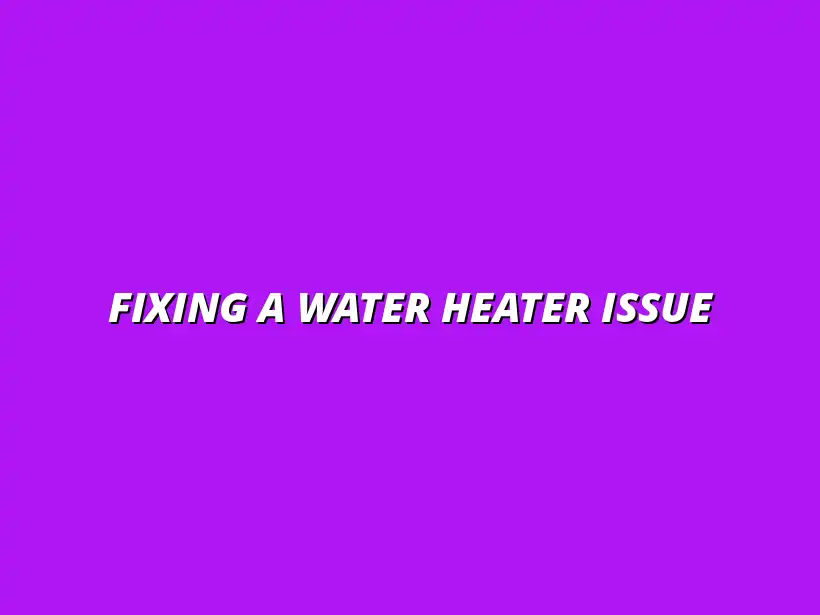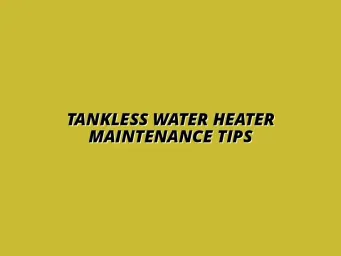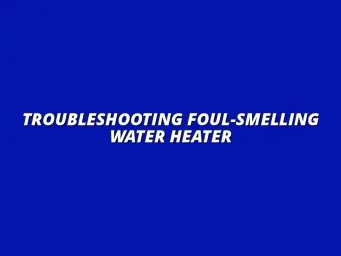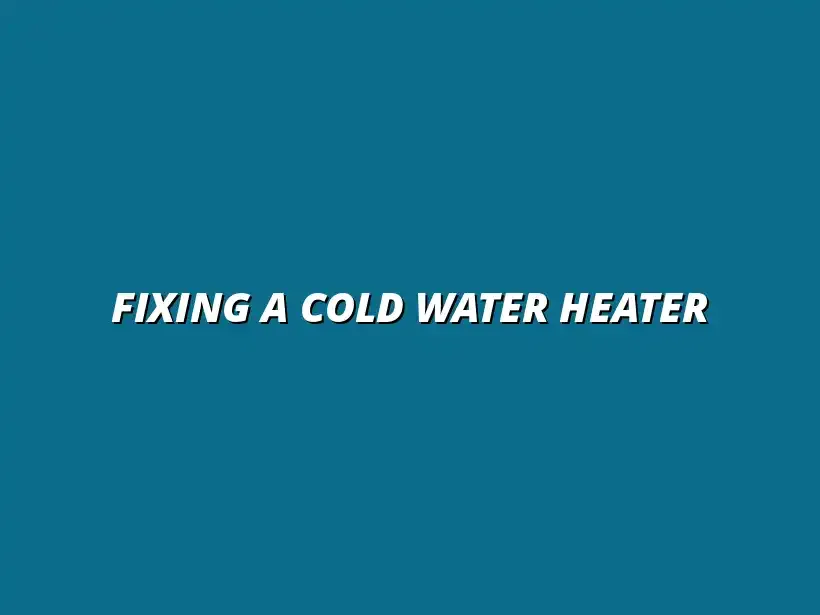
Fixing a Water Heater Issue
Understanding Common Water Heater Issues Leading to No Hot Water
When your water heater stops providing hot water, it can be frustrating and inconvenient. Understanding the common issues that lead to this problem is essential for effective troubleshooting. In this section, I will help you identify signs of a malfunctioning water heater and explore the common causes behind the lack of hot water.
Identifying Signs of a Malfunctioning Water Heater
It's important to recognize the signs that indicate your water heater may not be functioning properly. Some early warning signs can alert you before complete failure occurs. Below are some key indicators to watch for:
- Inconsistent water temperatures: Fluctuations in water heat can signal problems.
- Low water pressure: A sudden drop in water pressure may indicate an issue.
- Unusual noises: Popping, banging, or rumbling sounds can suggest sediment buildup.
Recognizing Inconsistent Water Temperatures
Inconsistent water temperatures are often one of the first signs that something is wrong with your water heater. If you notice that the water fluctuates between hot and cold, it’s time to investigate further. This could be due to issues with the heating elements or the thermostat. If the problem persists despite checking the thermostat, consider consulting a professional common water heater issues explained here.
Ensure to check if the temperature setting on your thermostat is correct. Sometimes, a simple adjustment can resolve the inconsistency. However, if the issue persists, seeking professional help might be necessary to diagnose the underlying cause.
Examining Unusual Noises from the Water Heater
Unusual noises coming from your water heater can be quite alarming. Sounds such as popping or rumbling could indicate that there’s sediment buildup inside the tank. This buildup can trap steam bubbles, which then burst and create the noise.
It's advisable to flush the tank periodically to remove any sediment. Ignoring these noises can lead to more serious issues, including potential tank damage, so it’s best to address them promptly!
Exploring Common Causes of No Hot Water
Understanding the common causes of no hot water can help you pinpoint the problem more effectively. Here are some frequent culprits that might be responsible for the lack of hot water:
- Electrical problems: Often arises in electric water heaters.
- Gas supply issues: A typical concern for gas water heaters.
- Thermostat malfunctions: Incorrect temperature settings can cause heating issues.
Electrical Problems in Electric Water Heaters
If you're using an electric water heater, electrical problems can often be the culprit behind your hot water woes. This may include blown fuses or tripped breakers that prevent the heater from operating. Always ensure the power supply is functioning correctly before diving deeper into troubleshooting.
In some cases, the heating element itself may be burnt out. If your water heater won't start, you can find helpful repair guides here. If this is the case, further investigation or professional assistance may be necessary to replace the faulty component.
Gas Supply Issues in Gas Water Heaters
Gas water heaters require a steady supply of gas to heat water effectively. If your pilot light goes out or there are issues with the gas line, you may find yourself without hot water. Regularly checking the gas supply and the pilot light can help avoid this problem.
If you notice that the pilot light is out, it’s crucial to follow safety protocols to safely re-light it. For efficient water heater maintenance, check out these maintenance tips. If you’re unsure, don't hesitate to consult a professional to avoid potential hazards.
Thermostat Malfunctions and Temperature Settings
The thermostat plays a vital role in regulating the temperature of your water heater. If it's malfunctioning or set incorrectly, you might not get hot water when you need it. Regularly checking the thermostat settings can help ensure your water heater operates at the desired temperature.
If you suspect that the thermostat is faulty, it may need to be replaced. This is often a straightforward process, but if you’re uncomfortable doing it yourself, calling a technician can save you time and effort!
Repair Techniques for Common Water Heater Problems
When your water heater is acting up, it can be frustrating! Fortunately, there are effective repair techniques you can try to fix common issues. Whether you have an electric or gas heater, knowing the right steps to take can save you time and money. Regular maintenance, such as maintaining your water heater regularly, can prevent many problems.
Let’s dive into the specific repairs for both electric and gas water heaters, ensuring you gain a solid understanding of what needs to be done. Remember, safety first! Always turn off the power or gas supply before attempting any repairs.
Fixing Electrical Issues in Electric Water Heaters
Electric water heaters can face several problems, often related to electrical components. If you notice your water isn’t heating, it might be due to a faulty heating element or thermostat. Here are the key repair techniques for these issues:
- Replacing a Faulty Heating Element: If the heating element is not working, it may need to be replaced. This involves draining the tank, removing the old element, and installing a new one. Make sure to check the wattage to match it with the new element.
- Repairing or Replacing the Thermostat: If the thermostat is malfunctioning, it could be causing inconsistent water temperatures. You can test it with a multimeter. If it’s faulty, simply replace it to restore proper function.
These repairs are often straightforward. However, if you feel unsure, it’s best to seek help from a professional to avoid any hazards!
Addressing Gas-Related Issues in Gas Water Heaters
Gas water heaters also come with their unique set of challenges. Generally, problems may arise from pilot light issues or gas supply faults. Understanding how to troubleshoot these can help you get hot water flowing again!
- Re-lighting the Pilot Light Safely: If the pilot light has gone out, follow the manufacturer’s instructions to safely relight it. Be cautious and ensure the gas line is functioning correctly before attempting this.
- Inspecting and Repairing Gas Lines and Valves: Check for any leaks in the gas line or issues with the valves. If you notice anything unusual, it’s essential to address it promptly. Sometimes, tightening the connections can solve minor leaks; other times, replacement may be necessary.
Always remember that dealing with gas can be dangerous. If you’re unsure at any point, don’t hesitate to call in a trained professional! For example, if you have plumbing issues in other areas of the house, like a leaky kitchen sink or a leaky bathroom faucet, you may want to consider calling a plumber.
Maintaining Your Water Heater for Optimal Performance
Preventive maintenance is key to keeping your water heater running smoothly! By regularly maintaining your unit, you can avoid many common problems and extend its lifespan. Let's look at some essential maintenance practices!
Taking simple steps can help ensure your water heater stays in top shape. Here are a couple of practices worth implementing regularly.
Implementing Preventive Maintenance Practices
Incorporating regular maintenance practices into your routine can significantly benefit your water heater’s performance. Here’s what you should consider:
- Regularly Flushing the Water Heater Tank: Flushing your tank every 6 to 12 months can remove sediment build-up, which can lead to inefficient heating.
- Checking Anode Rod Condition and Replacement: The anode rod helps prevent corrosion in the tank. Check its condition regularly and replace it when it becomes heavily corroded.
By performing these simple tasks, you can enhance the efficiency of your water heater and avoid unexpected repairs!
Answers to Frequently Asked Questions About Water Heater Repair
Many homeowners have questions when it comes to water heater repair. Let’s address some common queries that can help you better understand when to act and when to seek help!
Here are a couple of important questions and their answers:
What to Do When Water Heater Repair Isn't Sufficient?
If repairs aren’t fixing the problem, it may be time to consider replacing the unit altogether. Look for signs like frequent breakdowns or a significant decrease in water heating efficiency. Upgrading to a more efficient model could save you money in the long run!
When to Call a Professional for Water Heater Issues
Knowing when to call in a professional is crucial for your safety and the efficiency of your repairs. If you encounter complex issues, such as persistent leaks, gas odor, or electrical problems that you can't resolve, it’s best to seek expert assistance. For reliable plumbing services in your area, consider checking out local plumbers like this plumber in Billesley, Birmingham. Ensuring that the job is done right can provide peace of mind!




